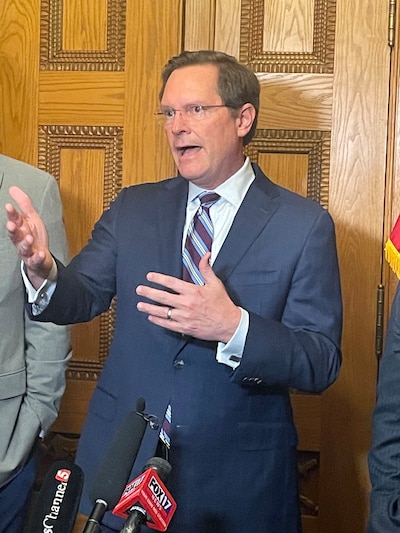Sign up for Chalkbeat Tennessee’s free daily newsletter to keep up with statewide education policy and Memphis-Shelby County Schools.
A proposal to create new education options for at-risk youth in Tennessee is drawing interest from charter school networks, both inside and outside the state.
Labeled “opportunity” charter schools, the campuses would serve middle and high schoolers dealing with a range of challenges, such as substance abuse and juvenile crime, chronic absenteeism, teen pregnancy, getting held back in several grades, or being at risk of dropping out.
“We’re very interested in the proposal, because it’s directed at a lot of students we already serve,” said Jocquell Rodgers, executive director of Green Dot Public Schools in Memphis, which views the network’s Hillcrest High School campus as a good candidate to become an opportunity charter school. Green Dot’s charter contract to run Hillcrest ends in 2026 under the state’s Achievement School District, or ASD, which appears to be on its way out.
Rodgers likes that the Republican-sponsored bill calls for the state education department to develop different expectations for opportunity charter schools. Those measures likely would focus on college and career readiness instead of academic proficiency.
“It’s very hard to get some of our students to proficiency, which was the promise of the ASD. But we can give them job training and workforce development and make sure they’re on track to graduate, get a job, or go to college or a trade school,” Rodgers said.
The National Alliance for Public Charter Schools views alternative education programs — for students who are struggling to attend and succeed in traditional public schools — as a growth area for the sector, especially if accountability expectations are adjusted. Nationally, charter schools already serve 42% of students who are enrolled in alternative education campuses.
Under the legislation by House Speaker Cameron Sexton and Sen. Ferrell Haile of Gallatin, enrolling in an opportunity charter school would be a matter of choice. At least 75% of the school’s students would have to be classified as at risk, and the school also could include a residential setting.
That would be significantly different from most of Tennessee’s current alternative education schools, which were created as mandatory short-term learning programs for students who were suspended or expelled from their traditional public school.
“It has worked in some other states,” Sexton told reporters recently about his charter school proposal. “We think it gives us another public option that could help kids in bad situations.”
Not everyone is on board with the idea.
Even some Republicans are wary of the prospect of opening the door to residential charter schools — a new type of publicly funded but independently run school of choice — or the potential of commingling at-risk student populations on one campus.
And leaders of traditional public schools say they’d prefer to meet the needs of at-risk students in existing local settings. They just need additional money to hire more teachers, counselors, behavior specialists, and social workers, they say, not new programs that divert funding from their school systems.
“We’ve said time and again that districts want to provide our students with more behavioral and mental health supports,” said Gary Lilly, executive director of the state superintendents organization.
Despite those tensions, the opportunity charter school legislation has advanced quickly since sponsors introduced it last month.
Last week, it passed the full Senate 19-7 along mostly partisan lines. It’s scheduled to be taken up Wednesday by the House’s finance subcommittee.
Sexton’s bill is narrower in scope than his 2023 charter proposal
A longtime charter school advocate, Sexton introduced a much broader charter bill last year that riled up the home school community and quickly stalled. That legislation proposed charter schools to serve home school students, in addition to a charter boarding school component.

It also would have allowed operators to apply directly to the state-appointed charter commission without going through local school boards, prompting pushback from leaders of traditional public schools.
This year, Sexton’s proposal removed any reference to home schools. And operators would have to apply directly to the local district for authorization. As under current law, they could appeal to the state charter commission if their application is rejected locally.
“We’re hopeful,” Sexton said last week when asked about the prospects for this year’s bill. “We tried to pass it last year. We had some opposition. We worked through some issues, and I think now we’re in a pretty good place on the House side.”
Proposal goes beyond temporary placement
Tennessee already has hundreds of alternative education schools and programs, mostly through local public school systems.
State law requires at least one alternative school or program for grades 7-12 in each district to serve students who are suspended or expelled, until they can return to a regular school setting. School systems have the option of creating alternative programs for students in grades 1-6. And some districts also have choice-based schools or programs to provide an alternative path for students who, for whatever reason, don’t fit well into a traditional school environment.
Sexton’s opportunity school legislation takes cues from charter school laws in dozens of other states, including California, Florida, New York, and Texas.
“It’s not a temporary placement like under Tennessee law, where students are mandated to attend for a period of time. It’s a choice, where the school becomes a student’s new home school to try to go and learn,” said Greg Lippman, a former California charter leader who recently founded the New York-based Groundswell Network to support local work on alternative education models across the nation.
Last fall, Lippman was in Memphis to talk with educators and nonprofit and community groups during a gathering organized by Bobby White, founder and CEO of the Frayser Community Schools charter network.
And next month, Groundswell will convene a national conversation at Nashville’s Belmont University to discuss school models to serve youths who are overaged and undereducated, involved in the juvenile justice system, foster kids, or facing other educational barriers.
Lippman said that his group is not the source of Sexton’s legislation but that he supports it, as does the Tennessee Charter School Center.
“Many states have a more expansive definition of alternative schools than under Tennessee’s current model,” he said. “It’s not surprising that the speaker’s office would find interested partners with expertise in this area.”
Funding would come through TISA
Under the bill, opportunity charter schools would receive funding through Tennessee’s new K-12 education formula known as the Tennessee Investment in Student Achievement, or TISA. The formula allocates more funding for students with higher needs, and the money follows the student to the school where they’re enrolled.
That’s a concern for the bill’s detractors, who say that dividing a finite amount of funding and resources for the same population of students won’t lead to better outcomes.
“Diverting funds to charter schools only rips funding from educational institutions that are constantly exploring ways to meet the needs of all students,” said Mary Jo Holmes, board president for the Tennessee Alternative Education Association.
“What will a charter school do that is better serving than current practices?” she asked, noting that Tennessee’s alternative education approach is based on collaboration among parents, educators, and disciplinarians.
“It is a team decision, not a menu item,” Holmes said.
Connor Grady, a spokesman for Sexton, said that, in addition to TISA funding, opportunity charter operators could partner with philanthropists or apply for federal grants, just as traditional schools and districts can.
Asked for examples of potential opportunity charter operators, Grady listed Goodwill’s Excel Center and groups in Colorado and Massachusetts.
Haile, the bill’s sponsor in the Senate, has said he doesn’t expect many opportunity charter operators to create residential schools due to the cost of such an endeavor. But it’s an option under the bill.
For Rodgers, the Green Dot charter operator in Memphis, the goal is to continue to do “transformation work” in a city with a large number of at-risk youth.
“Memphis-Shelby County Schools doesn’t have enough alternative schools to serve its own population, so maybe this could be a win-win,” Rodgers said. “It’s an opportunity for us to work together to address a big challenge in our community.”
You can track the bill’s status on the General Assembly’s website.
Marta Aldrich is a senior correspondent and covers the statehouse for Chalkbeat Tennessee. Contact her at maldrich@chalkbeat.org.






